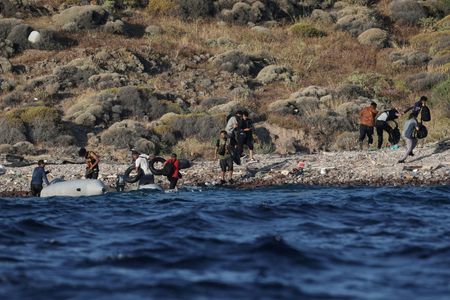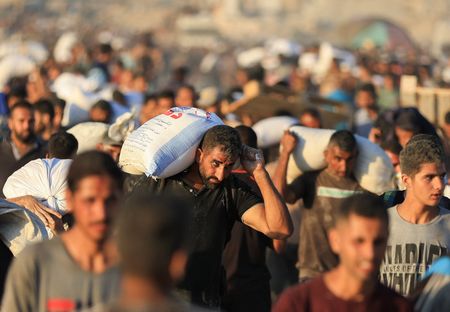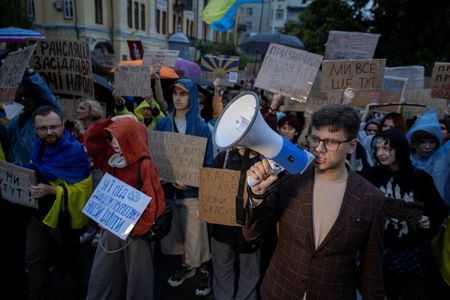By Edward McAllister and Vania Turner
LESBOS, Greece (Reuters) -Sailing in the June sunshine off the island of Lesbos, Greek fisherman Thanos Marmarinos remembers how he saved migrant women and children whose dinghy was breaking up in a gale one night ten years ago.
Initially, when he received the midnight call, he was reluctant to leave his bed. The winds were bitterly cold, and he had already been on one rescue mission that evening – thousands of migrants were arriving in rickety boats every day at that time.
“You’ll feel guilty if they drown,” the 70-year-old recalled his wife saying.
Soon he was lifting people onto his boat. One infant was wrapped up so tight he could only see their eyes.
“We would help again,” Marmarinos said. “I would be the first to.”
He risks jail if he does. Anyone caught helping migrants to shore today may face charges including facilitating illegal entry into Greece or helping a criminal enterprise under a 2021 law passed as part of Europe’s efforts to counter mass migration from the Middle East and Asia.
It’s one example of deterrents that have greatly reduced arrivals to Europe since the 2015 migration crisis but that rights groups say risk the lives of those attempting to enter.
Ten years ago, Lesbos, a tourist destination near Turkey ringed by quiet villages and tree-lined coves, became the first stop for half of the million people headed for Europe from countries including Syria, Afghanistan and Iraq.
Lesbos residents helped them find food and shelter and the island became a hub for charities and aid workers, and a symbol of Europe’s solidarity towards people fleeing war and poverty.
Today, the island shows how far government responses have hardened against people seeking refuge in Europe.
In 2015, some countries initially welcomed the new arrivals, especially those fleeing Syria’s civil war. German Chancellor Angela Merkel opened the borders to nearly 900,000 asylum seekers that year. But communities felt overwhelmed. Her ratings plummeted, and today, anti-immigration policies are multiplying across Europe.
By 2024, irregular migrant arrivals to the European Union had fallen to around 240,000, less than a quarter of 2015 levels, data from EU border agency Frontex show. Just 11,200 migrants, arrived in Lesbos last year, according to figures from the United Nations refugee agency, UNHCR.
When migrants arrive in Lesbos now, they are often intercepted by police as they near a coastal road used by holidaygoers. Charity workers need special permission from authorities to help them ashore or they face fines or imprisonment. A new camp to house migrants is under construction in a pine forest on a remote part of the island.
In the village of Skala Sikamias – which a decade ago was a frenzy of damaged dinghies, exhausted migrants and charity workers – tourists now dine on grilled fish while cicadas hum from the beachside pines.
The island’s tourism industry has recovered after a sharp drop. In 2024, the number of people arriving on international flights to Lesbos topped 76,000, according to Greece’s tourism confederation SETE, back to levels before the crisis.
“The island is moving on,” said Panagiotis Christofas, the mayor of Lesbos’ main city, Mytilene. “The crisis is in the past for us.”
“THEY COULD HAVE SAVED HER”
Not for everyone. At around 2 a.m. on April 3, Beck Morad Sadeji was on a dinghy approaching the island with 30 other migrants from Afghanistan including his wife of 55 years and his daughter, he told Reuters.
The coastguard ordered the boat back to Turkey, he said. But as a coastguard vessel approached the dinghy, it destabilised the overloaded craft, which held six families, including infants.
People fell overboard but the coastguard staff watched for several minutes without helping, Sadeji said. Eight people, including his wife and a 2-year-old boy, drowned.
“If they had helped, no one would’ve died,” Sadeji said.
In a statement on April 3, the coastguard said it launched a rescue operation immediately when it saw the dinghy was taking on water. In response to Reuters requests for comment, it said the coastguard always acts “with professionalism and absolute respect for human life”. Since 2015, Greece’s coastguard service has saved 263,000 third-country nationals in danger at sea, it said.
Sadeji said he still has nightmares and urges other migrants not to come.
“Humans are supposed to help other humans,” he said.
Migrant deaths in the Mediterranean, while far below 2015 levels, are still common. In the Eastern Mediterranean route alone, which includes Greece, 191 migrants died or went missing trying to reach Europe in 2024, according to data from the International Organisation for Migration, a UN agency. The IOM recorded 2,573 migrant deaths and disappearances on all Mediterranean routes last year.
Greece has come under scrutiny for its treatment of migrants and refugees approaching by sea, including one shipwreck in 2023 in which hundreds of migrants died after what witnesses said was the coastguard’s attempt to tow their trawler.
Frontex said in April it is reviewing 12 cases of alleged human rights violations by Greece, including some allegations migrants were pushed back across the frontier. In January, the European Court of Human Rights, which examines complaints against EU member states, found similar violations by Greece.
Greece denies that it violates human rights or that it forcefully returns asylum seekers from its shores.
Meanwhile, Greece’s centre-right government is outspoken against refugees coming by sea. In July, the new migration minister, Thanos Plevris, called the arrivals an “invasion”.
“We are worried about the rhetoric,” said Maria Clara Martin, UNHCR’s representative in Greece. “People will demand more restrictive policies just as conflict is on the rise.”
NEW MUSIC SCHOOL
Lesbos’s change of response was spurred by a March 2016 deal between the EU and Turkey whereby Syrian refugees who arrived in Greece from Turkey would be returned back across the border. Greece changed from being a transit country on the route to northern Europe to a holding zone where migrants had to wait for their fate to be decided.
The number of people stuck on the island swelled as asylum applications to other EU countries slowed. A camp in an old military base outside the village of Moria housed more than 10,000 by 2018, up from a few hundred before the summer of 2015.
Fights broke out between migrants. Locals accused them of stealing livestock and cutting down trees for firewood.
In Moria village, where the cobbled streets are barely wide enough for one car, thousands of camp residents would come daily in search of food. Businesses erected security cameras after a series of break-ins, locals said.
Thanasis Chatziargyriou runs a small window framing factory by the camp. “I couldn’t sleep at night because my alarm kept going off,” he said.
Voters on Lesbos swung to the right. Support for the far-right Golden Dawn Party peaked above 8% in a general election in September 2015, up from 4.6% earlier in the year, official data show.
“The political narrative became about how the refugees destroyed the island,” said Efi Latsoudi, a social scientist and charity worker in Lesbos. “People were talking only about the negative.”
A fire swept through Moria camp in 2020, gutting the makeshift structures used for housing and forcing thousands to sleep on the side of roads. Four Afghan asylum-seekers were sentenced to 10 years in prison for starting it, though their lawyers protested their innocence. Another smaller camp called Kara Tepe was built on the coast, which now houses about 1,000 people.
Today, on the exterior wall of the Moria camp, “Welcome to Europe” is still painted in capital letters. Another message has been scrubbed out but is just visible. “Human Rights Graveyard,” it reads.
Christofas, the mayor of Mytilene, said the Athens government plans to turn Kara Tepe into part of the city port. The Moria site will house a music school.
The annual “What Greeks Believe” opinion poll carried out last year by the Athens-based diaNEOsis think tank showed around 70% of respondents believed Greece should be stricter on managing migrant flows.
The European Union wants tougher rules. In May, the European Commission proposed an amendment to EU law that would allow member states to deport rejected asylum seekers to countries with which they have no connection. The proposal still needs approval by the European Parliament and the Council, which represents national governments.
In July, the United Kingdom and France announced tougher migration controls and Greece passed a law temporarily halting asylum claims from migrants coming from north Africa.
A senior government official, in response to Reuters questions, said Greece had taken the step to suspend those asylum claims in the face of a sharp rise in sea arrivals from North Africa, particularly from Libya.
“This decision sends a clear message to migrant smuggling networks: Greece is not an open corridor to Europe and illegal crossings will not lead to legal settlement,” said the official, adding that authorities were ready to work with Libya to stop migrants at source.
“TOO BIG”
Lesbos’s future, EU-funded, migrant camp is cut into a depression between wooded hills at the end of a dirt track about 40 km (24 miles) north of Mytilene. The facility will be able to house 5,000 people.
Unlike Kara Tepe, which is a short walk from a supermarket, this site comprising rows of identical grey shipping containers is miles from the nearest convenience store.
Locals oppose it, saying it will increase the threat of wildfires in a region that often does not see rain for months.
“The camp is too big for the island,” said mayor Christofas. He sees no need for such a camp on Lesbos, given slowing migrant arrivals.
But people do still come.
Out at sea that June morning, fisherman Marmarinos spotted another small dinghy approaching.
It held 19 migrants, from Yemen and Sudan, according to Legal Centre Lesbos, a local aid agency that provides legal assistance to migrants.
Marmarinos said he spent so much time in 2015 helping migrants that he barely made a fishing wage. This time, he was reluctant to approach the vessel in case he got in trouble with the coast guard. He looked from afar. If they needed him, he would help, he said.
The boat landed in a rocky cove. The migrants disembarked and ran up a steep hillside. Police, who monitor the coastline from the cliffs, picked up the migrants and took them to a holding camp.
“Someone will call to say a boat has come, and the coast guard will come. We’d better get out of here,” Marmarinos said.
(Reporting by Edward McAllister, Vania Turner and Louisa Gouliamaki, Editing by Sara Ledwith)













